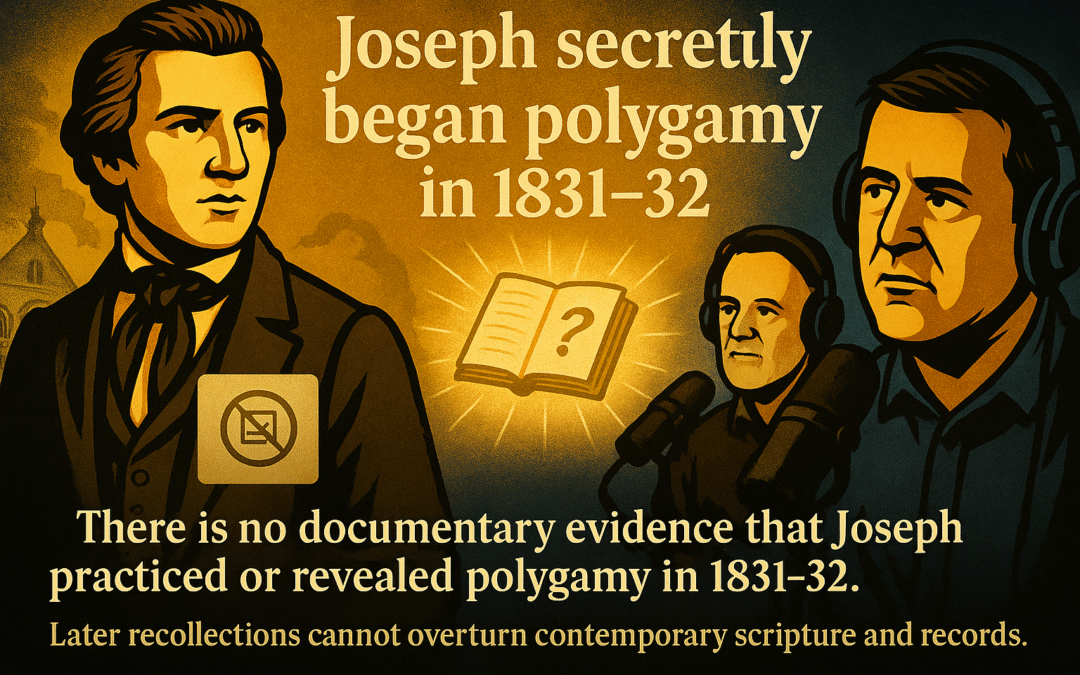
by Anonymous | Aug 27, 2025 | Joseph Smith
Bottom Line
There is no documentary evidence that Joseph practiced or revealed polygamy in 1831–32. Later recollections cannot overturn contemporary scripture and records.
| Podcast |
Mormon Stories Podcast – John Dehlin & John Turner |
| Episode |
Did Joseph Smith Speak in Tongues? (Pt. 12) – Ep. 2053 |
| Title |
“Joseph secretly began polygamy in 1831–32.” |
| Category |
Polygamy / Early Doctrine |
| Quote |
“Joseph Smith privately removed ambiguity from the matter about the time Jesse Gaus was converted… Joseph told individuals that he had inquired of the Lord concerning the principle of plurality of wives and received for answer that it was a true principle.” — John Dehlin citing Quinn, 00:23:55–00:29:30 |
| Core Claim |
Joseph introduced polygamy as early as 1831–32, decades before Nauvoo. |
| Conclusion |
Unverified → Retroactive Memory Inflation |
| Logical Questions |
- Are there contemporary 1830s records confirming this?
- What does the 1835 Doctrine & Covenants say?
- Do later reminiscences outweigh primary evidence?
|
🔍 Core Finding
📖 Doctrinal Context
The Book of Mormon (Jacob 2:27–30) condemns polygamy except if God commands it. No revelation on polygamy was canonized until D&C 132 (1843). In 1835, the official D&C explicitly denied polygamy (D&C 101:4, 1835 edition).
The claim rests on speculation, not evidence. Even D. Michael Quinn admitted ambiguity. The historical record shows Joseph did not introduce formal polygamy until the 1840s.
📊 Factual Verification
- No 1831–32 document in the Joseph Smith Papers records a polygamy revelation.
- The only “evidence” is William Phelps’ 1861 recollection—30 years later.
- Joseph’s first known plural marriage was to Fanny Alger (~1835–36), not 1831.
🤔 Likely Misunderstanding
Critics assume later recollections prove early polygamy. But memory inflation decades after Joseph’s death (esp. amid RLDS vs. Utah debates) is unreliable compared to contemporaneous records.
⚖️ Legal / Media Literacy Note
Presenting speculation as fact risks misleading audiences and mischaracterizing Joseph’s history.
There is no documentary evidence that Joseph practiced or revealed polygamy in 1831–32. Later recollections cannot overturn contemporary scripture and records.
📚 Sources
- Jacob 2:27–30, Book of Mormon
- D&C 101 (1835 edition)
- William Phelps letter, 1861 (cited in JSP)
- Saints, Vol. 1, ch. 16
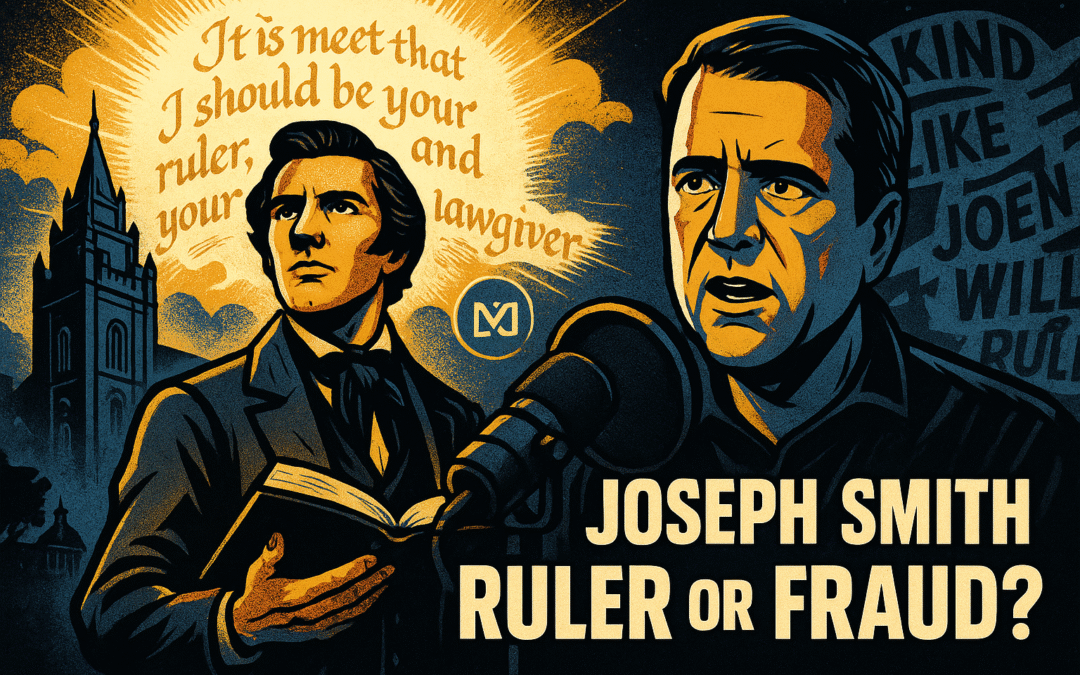
by Anonymous | Aug 9, 2025 | Joseph Smith
Bottom Line
The claim that Joseph equated himself with divine rulership is a distortion. The text plainly exalts Christ, not Joseph. This is scripture misrepresented as ambition.
| Podcast |
Mormon Stories – Joseph Smith Podcast |
| Episode |
Ep. 2046 – John Turner Pt. 9 |
| Category |
Prophetic Authority & Revelation Misrepresentation |
| Quote |
“He receives a revelation basically where he says he has Jesus saying, ‘I will be your ruler’ … it’s kind of like Joseph saying, ‘I will be your ruler.’ … That combined with ‘I am Joseph the prophet.’ That’s a level of hubris…” — John Dehlin, 00:36:29–00:38:29:contentReference[oaicite:0]{index=0} |
| Core Claim |
Joseph Smith used divine revelation as a mask for personal power, equating “Jesus will be your ruler” with “Joseph will be your ruler.” |
| Conclusion |
False / Rhetorically Misleading |
| Logical Questions |
- Is the “I will be your ruler” phrase directly from Jesus Christ in canonized scripture?
- Does the context of the revelation support Dehlin’s inference?
- Is there a pattern in Joseph’s early revelations that shows consolidation of personal power?
|
🔍 Core Finding
This quote grossly distorts the meaning of Doctrine and Covenants 41:4, which reads:
“He that receiveth my law and doeth it, the same is my disciple… for it is meet that I should be your ruler, and your lawgiver.”
— D&C 41:4
The speaker is Jesus Christ, not Joseph Smith. The verse continues a scriptural tradition of divine kingship:
- Isaiah 33:22: “The Lord is our king.”
- Mosiah 2:19: “Ye are eternally indebted to your heavenly King.”
- 2 Nephi 10:14: “He that fighteth against Zion… shall be as a garment in a furnace of fire.”
Joseph’s leadership followed a revealed structure, with checks and ratification by councils and membership. D&C 28:2 makes clear:
“No one shall be appointed to receive commandments and revelations in this church excepting my servant Joseph Smith, Jun.”
— D&C 28:2
Bottom Line
The claim that Joseph equated himself with divine rulership is a distortion. The text plainly exalts Christ, not Joseph. This is scripture misrepresented as ambition.
📚 Sources
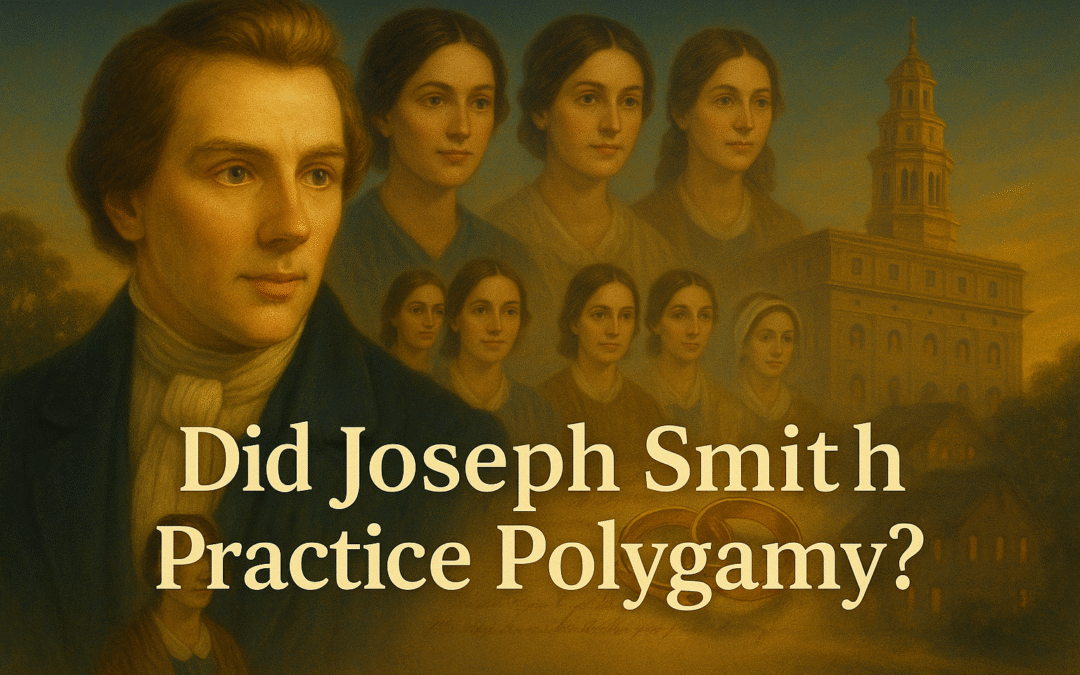
by Anonymous | Aug 9, 2025 | Doctrine, Doctrines Policy Practice, Joseph Smith
Executive Brief: Did Joseph Smith Practice Polygamy?
Core question: Did Joseph Smith
begin the practice of plural marriage, or did Brigham Young introduce it after
Joseph’s death?
⏳
Timeline Overview
- 1830–1835: Public monogamy;
possible sealing to Fanny Alger.
- 1841–1844: Joseph secretly seals
to 30+ women in Nauvoo. D&C 132 dictated in 1843.
- June 1844: Nauvoo Expositor
exposes polygamy. Joseph and Hyrum killed.
- 1852: Brigham Young announces
polygamy and publishes D&C 132.
- 1860: RLDS founded under Joseph
Smith III, denying Joseph practiced polygamy.
📚
Evidence That Joseph Smith Originated Polygamy
- D&C 132: Dictated July 12, 1843 by Joseph Smith; scribed by William Clayton. Validated
by Clayton, Hyrum Smith, and Kingsbury.
- Plural Wives: Sealed to 29–33
women including Eliza R. Snow, Emily Partridge, Helen Mar Kimball. (Compton, Hales)
- Sexual Relations: Emily Partridge
and Melissa Lott testified under oath to conjugal relations with Joseph.
- Church Acknowledgment: The LDS
Church confirmed Joseph practiced polygamy in the 2014 Gospel Topics essay.
- Scholarly Consensus: Confirmed by
Bushman, Compton, Hales, and even modern RLDS historians.
🔍
The Case That Brigham Young Originated or Exaggerated Polygamy
- Public Denials: Joseph publicly
said he had only one wife, even weeks before his death.
- Emma Smith: Denied Joseph ever
practiced or taught polygamy.
- RLDS Tradition: Joseph Smith III
gathered affidavits supporting his father’s innocence.
- D&C 132 Skepticism: Not
published until 1852. Survives only in copies. Edits by Willard Richards raise
timeline questions.
- Scriptural Conflicts: Book of
Mormon (Jacob 2:24) and Joseph’s JST edits condemn David & Solomon’s plural
marriages.
📊
Comparative Analysis
| Category |
Joseph Started It |
Brigham Invented It |
| Historical Evidence |
Dozens of journals, affidavits, and sealing records |
No
contemporary documents from Joseph; D&C 132 published
posthumously |
| Witness Testimony |
Emily Partridge, Malissa Lott, Eliza Snow, William
Clayton |
Emma
Smith, Joseph Smith III, William Marks, RLDS statements |
| Church Position |
LDS
acknowledges Joseph introduced it |
RLDS
originally denied it, now acknowledges it historically |
| Conspiracy Burden |
No
whistleblowers from 70+ alleged participants |
Requires massive, silent conspiracy by Brigham and all Utah
leaders |
| Scriptural Support |
D&C 132, patriarchal precedents |
Jacob 2, JST changes, 1835 D&C monogamy clause |
Conclusion: What We Know and What Remains Uncertain
We know:
- Joseph
Smith secretly practiced polygamy in Nauvoo.
- Brigham
Young openly continued and expanded it in Utah.
- The LDS
Church affirms Joseph’s involvement; RLDS once denied it but later conceded to
the evidence.
Uncertain:
- Joseph’s
private feelings and motivations
- Whether
all sealings were consummated
- Emma’s
true level of knowledge and emotional coping
- Why no
children resulted from plural unions
“Joseph Smith did
practice plural marriage—even if he kept it secret. Brigham Young didn’t invent
it; he exposed it. That’s what the evidence shows.”
Want more?
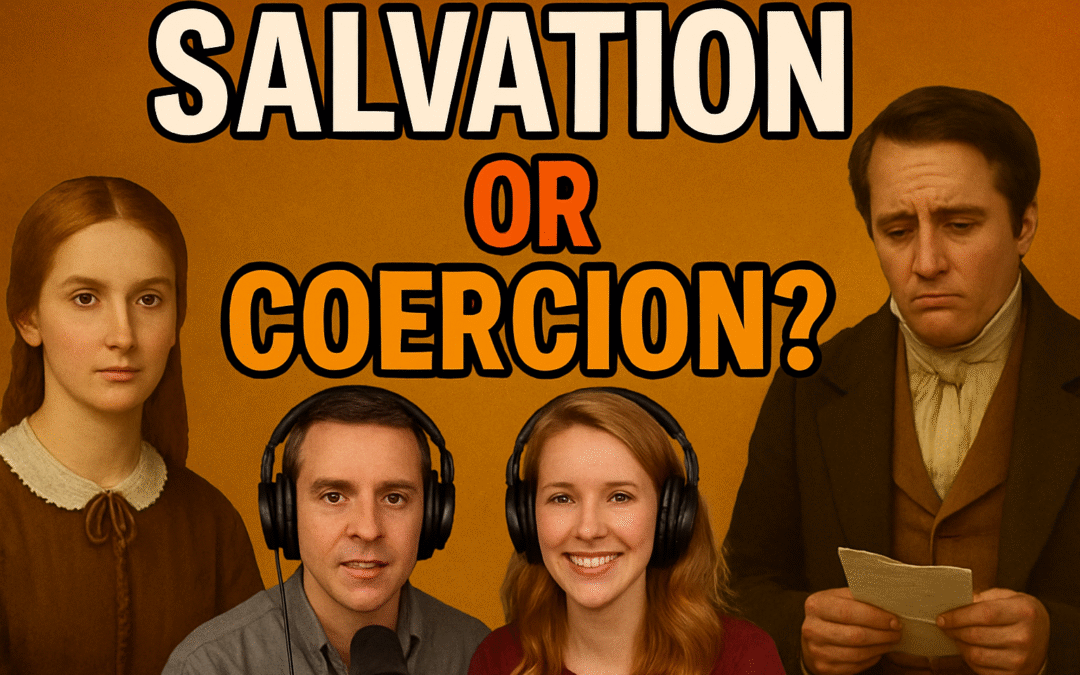
by Anonymous | Jul 21, 2025 | Joseph Smith
Bottom Line
Joseph Smith’s sealing to Helen Mar Kimball was difficult, doctrinal, and ethically uncomfortable — especially due to her age. But there is no record that she, or her parents, considered it forced, fraudulent, or abusive. If we accept their testimonies, we must grapple with a hard truth: this wasn’t trafficking — it was religious sacrifice, however foreign that looks today.
| Podcast |
Mormon Stories |
| Episode |
“Did Joseph Smith Engage in Human Trafficking?” (Ep. 1794) |
| Title |
Did Joseph Smith Promise Salvation in Exchange for a 14-Year-Old Bride? |
| Category |
Historical Polygamy / Coercion & Spiritual Abuse |
| Quote |
“Joseph Smith is offering Heber C. Kimball eternal salvation and exaltation… in exchange for his 14-year-old daughter.” — John Dehlin, 01:56:58 |
| Core Claim |
Joseph Smith manipulated Heber C. Kimball into giving him his 14-year-old daughter Helen Mar Kimball as a plural wife, by promising exaltation for the family — a form of spiritual bribery and coercion. |
| Conclusion |
Partial Truth / Ethically Troubling but Not Forced |
| Logical Questions |
- Did Joseph Smith explicitly promise salvation in exchange for Helen Mar Kimball?
- Did Helen or her parents report being coerced, deceived, or forced?
- What did Helen herself say about her choice, and does it reflect fraud or trauma?
|
🔍 Core Findings
🧭 The Alleged “Bargain”: Marriage for Salvation
This accusation stems from a widely cited passage in Helen Mar Kimball’s later writings where she recalled Joseph promising:
“If you take this step, it will ensure your eternal salvation and exaltation and that of your father’s household and all of your kindred.”
— Helen Mar Kimball Whitney, Why We Practice Plural Marriage (1884)
Critics frame this as a quid pro quo: a teenage girl exchanged for heavenly reward. The language is uncomfortable, yes. But it’s essential to examine how Helen understood this offer — and whether she considered herself a victim.
📜 Did Helen Say She Was Forced or Tricked?
Helen Mar Kimball was 14 years old at the time of her sealing to Joseph. That age is deeply problematic by today’s standards. But she was not a random, uninformed girl. She was:
- The daughter of a top Church leader (Heber C. Kimball)
- Raised in a home familiar with intense religious sacrifice
- Offered the chance to seek her own spiritual witness
She later described spiritual difficulty and emotional struggle — but she never claimed to be physically forced or spiritually deceived.
“I would never have been sealed to Joseph had I known it was anything more than a ceremony. I was young, and they deceived me by saying the salvation of our whole family depended upon it.”
— Reported in Catherine Lewis, Narrative of Some of the Proceedings of the Mormons (1853)
This quote is often used as evidence of regret. But Helen also defended plural marriage in her adult life — and she never described herself as coerced. She accepted the sealing as a sacred principle once she matured in faith.
🤝 Was Her Father Manipulated?
Heber C. Kimball did arrange the sealing. Critics describe it as a “trade,” and Helen used the metaphor of being the “lamb laid on the altar.” But again, this reflects a deeply religious worldview — not a criminal transaction.
No historical record indicates that Heber felt “bribed” or “defrauded.” To him, sacrificing for the gospel — even with his family — was a sacred Abrahamic principle, not extortion.
“This principle was established by the Prophet Joseph Smith… for the purpose of raising a righteous seed.”
— Helen Mar Whitney, Plural Marriage as Taught by the Prophet Joseph Smith
⚖️ Ethical vs. Criminal
Let’s be clear: sealing a 14-year-old to a 37-year-old is ethically problematic by today’s standards. Even Brigham Young later discouraged similar age gaps. But to call it coercion or fraud collapses under historical scrutiny:
- Helen’s testimony reflects religious belief, not deceit.
- She later wrote of her sealing in terms of sacrifice and faith — not trauma or betrayal.
- Neither she nor her parents described the offer as a spiritual bribe.
“The promise of salvation in exchange for obedience to plural marriage was doctrinal, not transactional. All temple covenants include conditional promises. This does not constitute trafficking or fraud.”
— Mormoner.org – Helen Mar Kimball Case Study
📚 Sources
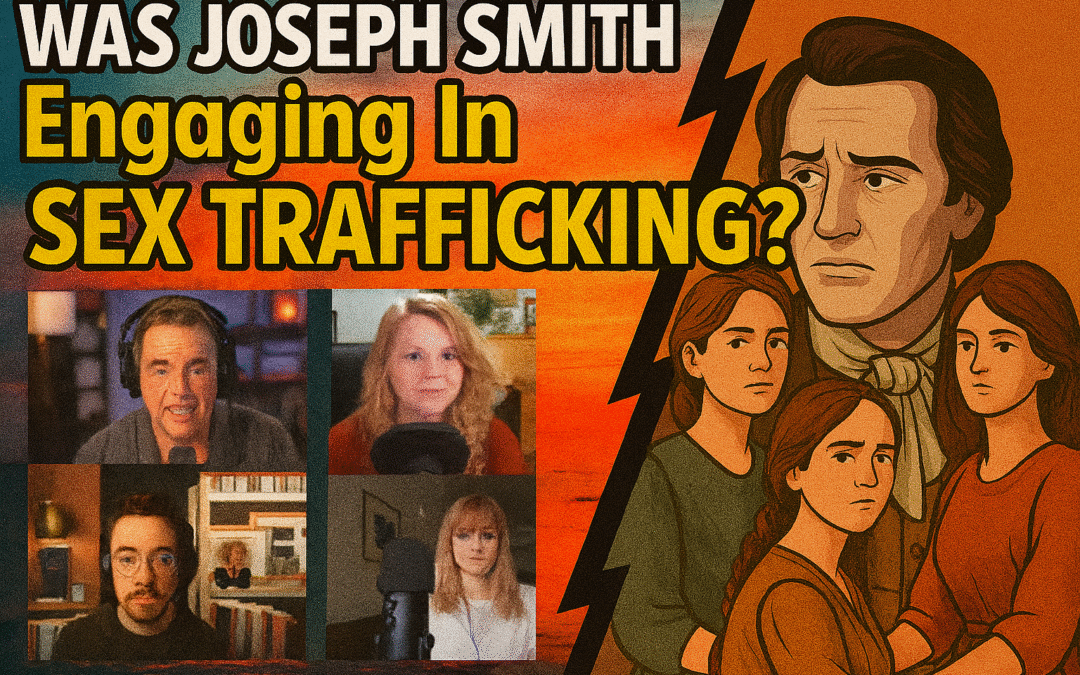
by Anonymous | Jul 21, 2025 | Joseph Smith
Bottom Line:
Accusing Joseph Smith of sex trafficking is not just legally inaccurate — it’s historically reckless. His plural marriages were religious, not commercial. Women were not exchanged for money, nor held against their will. Even if modern audiences find 19th-century polygamy disturbing, it simply does not meet the criteria for sex trafficking under U.S. law. To equate the two trivializes real human trafficking — and erases the actual voices of the women involved.
| Podcast |
Mormon Stories |
| Episode |
“Did Joseph Smith Engage in Human Trafficking?” (Ep. 1794) |
| Title |
Did Joseph Smith’s Polygamy Qualify as Sex Trafficking? |
| Category |
Historical Polygamy / Legal Accusation |
| Quote |
“What we’re asking is a legitimate question: was Joseph Smith’s behavior in Nauvoo something that would qualify under today’s standards for human trafficking?” — John Dehlin, |
| Core Claim |
Joseph Smith’s practice of polygamy, including recruiting converts from Europe and marrying young or vulnerable women, would qualify as sex trafficking under modern U.S. legal definitions. |
| Conclusion |
The Claim is False / Legally Misapplied |
| Logical Questions |
- Does Joseph Smith’s religious polygamy meet the legal elements of sex trafficking under U.S. federal law?
- Did the women he married describe themselves as coerced or trafficked?
- Are 19th-century marriages equivalent to modern criminal acts involving force, fraud, or commercial sex?
|
🔍 Core Rebuttal
⚖️ What Is Legally Considered Sex Trafficking?
According to the U.S. Department of Justice and the Trafficking Victims Protection Act (TVPA), sex trafficking requires:
- A commercial sex act;
- Obtained through force, fraud, or coercion;
- OR, if the person is under 18, any commercial sex act, regardless of coercion.
Critically, “commercial” means for monetary or financial benefit. Marriage — even with sex — does not qualify unless money, goods, or services are exchanged for the sexual activity (see DOJ TVPA Guidelines, 22 U.S.C. § 7102(11)).
“Though many modern scholars criticize polygamy on moral or ethical grounds, it does not meet the statutory definition of sex trafficking without clear evidence of commercial exchange or criminal coercion.”
— Mormoner.org
👨⚖️ What About “Spiritual Coercion”?
The panel claims that Joseph’s sealing proposals — especially promises of salvation — are equivalent to force or coercion under modern law. But this is a serious misapplication:
- Religious influence is not equivalent to legal force.
- The U.S. Supreme Court has repeatedly protected religious assent as voluntary, even when countercultural (Employment Division v. Smith, 494 U.S. 872 (1990)).
Did Joseph Smith exert strong religious influence? Yes. But influence is not coercion unless backed by threat of violence or restraint — which no woman ever accused him of.
“He asked me to pray and get my own witness. I did, and I received a calm, sweet peace that never left me.”
— Lucy Walker, Affidavit, 1902 [source]
🔍 Were There Trafficking “Networks”?
The podcast suggests Joseph Smith orchestrated a trafficking operation through missionaries who “recruited” vulnerable European converts to Nauvoo under false pretenses. But that claim ignores several facts:
- Women traveled voluntarily as converts, not as sex slaves.
- The Nauvoo Expositor used trafficking rhetoric for political exposé, not legal accusation.
- There is no evidence that women were chained, sold, exchanged for money, or imprisoned — all required elements for trafficking cases.
Even critics like Todd Compton (In Sacred Loneliness) describe the relationships as emotionally and spiritually complex, not exploitative transactions.
🤝 What Did the Women Say?
The podcast repeatedly ignores the words of the women themselves:
- Zina Huntington described her sealing as divinely confirmed.
- Helen Mar Kimball later defended plural marriage as a revealed principle.
- Emily Partridge admitted to conjugal relations with Joseph, but never accused him of abuse.
Their full testimonies are preserved at JosephSmithsPolygamy.org and Mormoner.org.
📚 Sources






